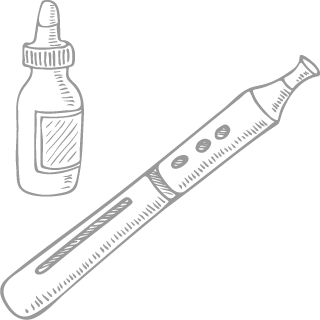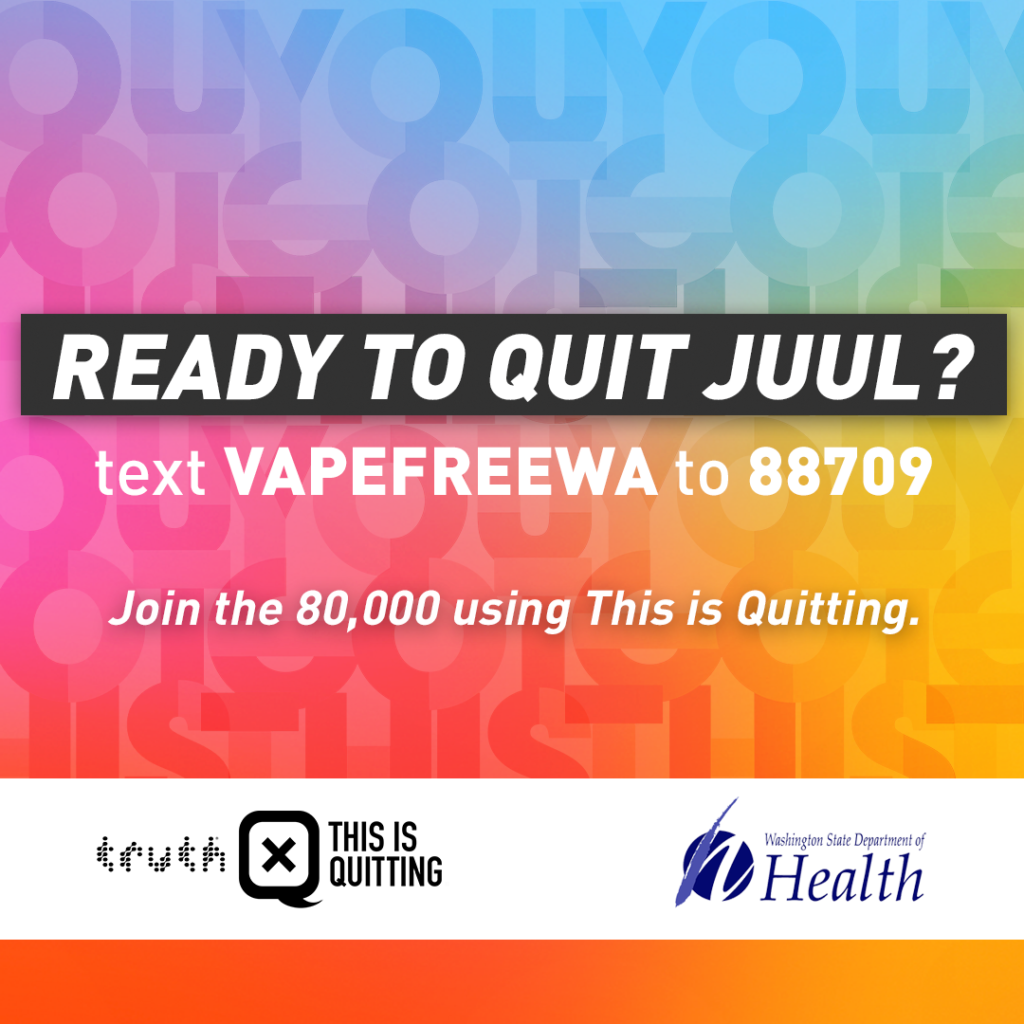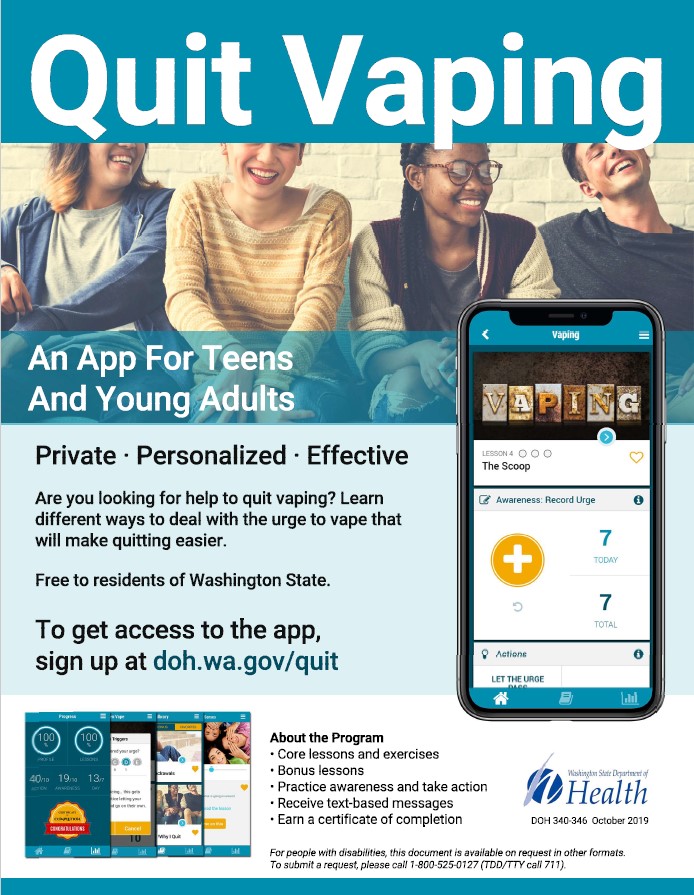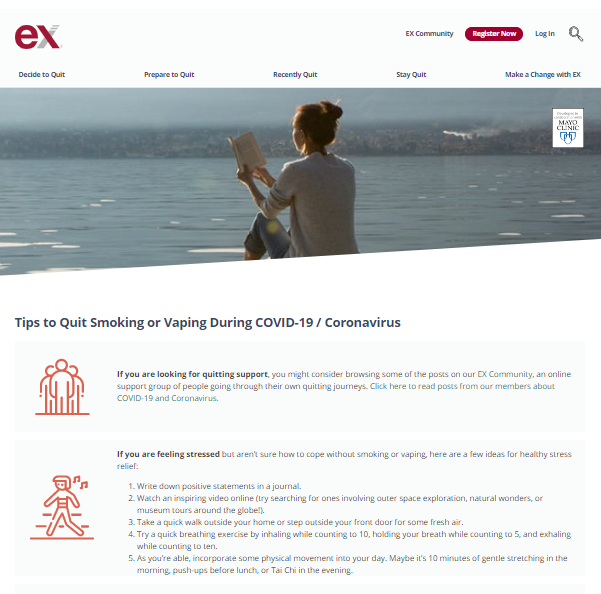Resources for Counselors and Health Care Professionals
Establishing a safe environment where students can talk about their feelings and opinions without feeling judged can help open the door to a conversation about vaping. Really listen and let them tell you what they know.
Information and Resources
Students Who Smoke or Vape: A Red Flag for Supports
Washington Department of Health
Evidence on the Health Impacts of E-Cigarettes and Vaping
A rigorous and comprehensive review of the science around e-cigarettes and vaping.
American Academy of Pediatrics
Tobacco Control & Prevention Toolkit
Facts, videos, education, research, advocacy and policy initiatives related to tobacco control and prevention. This information is intended to support pediatricians, public health professionals and other key stakeholders prevent tobacco use and exposure in children and families and promote cessation in adolescents and adults who use tobacco.
American Academy of Pediatrics
E-Cigarettes & Vaping: Resources for Pediatricians and Families
The American Academy of Pediatrics (AAP) provides a resource web page with quick facts, ready made presentations, curriculum, educational videos, clinical training videos, and information on nicotine replacement therapy for supporting addicted youth.
OSPI
Red Flags for Supports: Students Who Smoke or Vape
The 2018 Healthy Youth Survey shows that students who reported vaping, smoking, and using tobacco may be at increased risk for using other substances and experiencing depressive symptoms and thoughts of suicide.
Surgeon General
Health Care Professionals: Educate Your Young Patients About the Risks of E-cigarettes
Teenagers are more likely to get information on health issues from their parents and their health care providers than from peers, the internet, or social media.
American Academy of Pediatrics
Supporting Youth Who Are Addicted to Nicotine: Advice for Pediatricians
This factsheet provides tools to support professionals working with youth and teens who indicate a nicotine addiction. Conversation guides, addiction level assessment tools, cessation supports, and health guidance.
Quitting Resources
The resources below will provide information on how to quit.
Additionally, you can call 1-800-QUIT-NOW to have a Quit Guide and other printed materials sent to you for free.
Cessation Resources
Get the Facts about Vaping/JUULing
Vaping/JUULing

AKA:
E-cigs, electronic cigarettes, JUULs
What is Vaping?
Vapor products produce aerosol by heating a liquid solution. Users inhale the aerosol into the lungs. There are chemicals and nicotine in the aerosol, not just water vapor.
Laws & Legal Status
The law applies to what is being vaped in an e-cig. Meaning, in Washington State, marijuana vaping is legal for adults over 21, and vaping nicotine is legal for adults over 18. As of Jan. 1, 2020 it will be illegal to sell or give tobacco or vaping products to people under age 21.
Affect on Your Developing Brain
While the brain is still developing, young people are at higher risk for long-term, long-lasting effects of exposure to nicotine, including an increased risk of addiction. Nicotine can harm the parts of the brain that control attention and learning.
Is it Addicting?
Yes. Nicotine is addicting to young people and adults. Young people's brains are growing faster than adult brains, and are therefore can get addicted more easily than adults.
Affect on Your Body
Scientists are still trying to understand the long-term health effects of vaping, both for users and those exposed to vaping second-hand. Vaping is known to have negative affects on respiratory health because of the harmful and potentially harmful chemicals in the e-cigs, including nicotine and other chemicals linked to lung disease.
What if someone needs help?
Teen Link: 1-866-Teenlink
(1-866-833-6546)
Available 6pm–10pm PST
Teen Talk: 360-397-2428
Available Monday –Thursday 4-9pm, Friday 4-7pm PST
Where to go for more info
Need Additional Resources?
Have a question that we didn’t answer? Submit it to preventcoalition@esd112.org and a Youth Now coordinator will get back to you with answers straight to your inbox.




